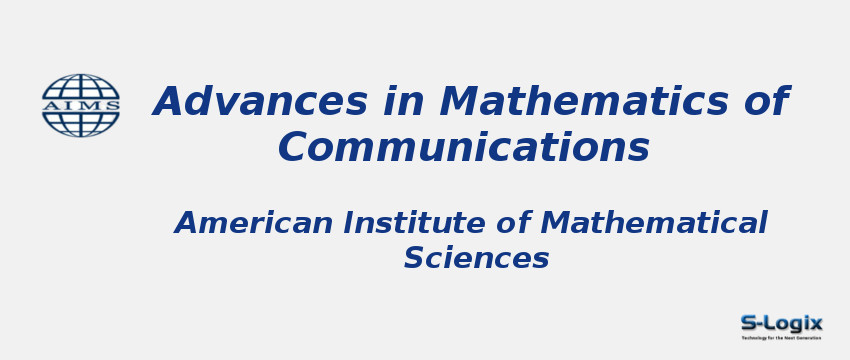The Advances in Mathematics of Communications Journal serves as a leading platform for researchers, practitioners, and academics in the field of mathematical communications. The journal publishes high-quality research papers, review articles, and case studies that contribute to the understanding and advancement of mathematical techniques and their applications in communication systems.
Objective:
The primary objective of the Advances in Mathematics of Communications Journal is to advance the field of mathematical communications by providing a forum for the dissemination of original research findings. The journal covers various topics within mathematical communications, including coding theory, cryptography, information theory, network theory, and signal processing. By integrating theoretical insights with practical applications, the journal aims to foster the development of new theories, models, and methodologies in mathematical communications.
Interdisciplinary Approach:
The Advances in Mathematics of Communications Journal promotes an interdisciplinary approach by encouraging contributions that bridge various areas of mathematics, computer science, and engineering. The journal welcomes research that explores the intersection of mathematical theory with communication technologies, algorithm design, and real-world applications. By fostering collaborations across disciplines, the journal facilitates the dissemination of innovative research that addresses complex challenges in the design, analysis, and optimization of communication systems.
Impact:
The impact of the Advances in Mathematics of Communications Journal is significant in advancing both the theoretical foundations and practical applications of mathematical communications. By publishing rigorous research papers, review articles, and case studies, the journal contributes to the development of new mathematical techniques, optimization strategies, and analytical methods. Its publications inform the design and implementation of efficient communication systems, influence advancements in secure and reliable data transmission, and support the theoretical underpinnings of emerging communication technologies. The journals emphasis on high-quality research and practical relevance ensures its contributions support the continuous evolution of mathematical communications.
Significance:
The Advances in Mathematics of Communications Journal holds significant importance for researchers, educators, and practitioners interested in advancing the field of mathematical communications. The journals contributions include theoretical advancements, practical applications, and critical analyses of communication-related problems and techniques. By providing a platform for scholarly exchange and knowledge dissemination, the journal supports the development of innovative solutions that address real-world challenges in communication system design, optimization, and security. It fosters the continuous advancement of mathematical methodologies and technologies, facilitating the development of robust and efficient communication systems that meet the demands of modern scientific, technological, and industrial applications.
Journal Home: Journal Homepage
Editor-in-Chief: Jintai Ding
scope:
The Advances in Mathematics of Communications journal focuses on research in the interplay between mathematics and communication technology, encompassing a wide range of theoretical and practical topics. Here is an overview of its scope and topics covered:
Information Theory:
Research on the mathematical foundations of information theory, including coding theory, data compression, and entropy measures. Studies include the development of new codes, analysis of existing codes, and applications in data transmission and storage.
Cryptography and Security:
Studies on the mathematical aspects of cryptography and security. Topics include encryption algorithms, cryptographic protocols, key management, and mathematical techniques for ensuring data integrity and confidentiality.
Network Theory:
Research on the mathematical modeling and analysis of communication networks. This includes studies on network topology, routing algorithms, network optimization, and the impact of network structure on communication performance.
Signal Processing:
Studies on the mathematical methods used in signal processing. Topics include Fourier analysis, wavelet transforms, filtering techniques, and the development of algorithms for signal reconstruction and enhancement.
Communication Systems:
Research on the mathematical modeling and analysis of communication systems. This includes studies on modulation techniques, error correction, system capacity, and performance analysis of various communication technologies.
Wireless Communications:
Studies on the mathematical aspects of wireless communication systems. Topics include channel modeling, interference management, resource allocation, and the development of algorithms for improving wireless network performance.
Optimization in Communications:
Research on the application of optimization techniques to communication problems. This includes linear and nonlinear programming, game theory, and combinatorial optimization applied to network design, resource allocation, and signal processing.
Algorithms and Complexity:
Studies on the development and analysis of algorithms for communication systems. This includes research on algorithmic complexity, approximation algorithms, and the computational feasibility of communication protocols.
Mathematical Modeling:
Research on the development of mathematical models for various communication processes. This includes stochastic modeling, queueing theory, and the use of differential equations to describe communication dynamics.
Interdisciplinary Applications:
Studies that explore the application of mathematical communication techniques to other fields. This includes research on bioinformatics, social networks, financial networks, and other areas where communication plays a critical role.
Emerging Technologies:
Research on the mathematical challenges and opportunities presented by emerging communication technologies. Topics include the Internet of Things (IoT), 5G/6G networks, quantum communication, and the integration of artificial intelligence in communication systems.
Print ISSN: 1930-5346
Electronic ISSN: 1930-5338
Abstracting and Indexing: Science Citation Index Expanded, Scopus.
Imapct Factor 2023: 0.7
Subject Area and Category: Computer Science, Electronics and Telecommunications, Mathematics
Publication Frequency: Quarterly
H Index: 27
Q1:
Q2: Applied Mathematics
Q3:
Q4:
Cite Score: 2.2
SNIP: 1.047
Journal Rank(SJR): 0.463
Latest Articles: Latest Articles in Advances in Mathematics of Communications
Guidelines for Authors: Advances in Mathematics of Communications Author Guidelines
Paper Submissions: Paper Submissions in Advances in Mathematics of Communications
Publisher: American Institute of Mathematical Sciences
Country: USA
